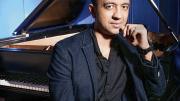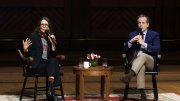Pianist and composer Vijay Iyer calls himself a “reluctant educator.” Whereas teachers set an example, he says, “to be an artist is to always be radically unfinished, to seek out transformation.” Iyer is Harvard’s first jazz artist-in-residence and tenured professor, a complex dual role: “What does it mean to be connected to a vernacular music that’s part of grassroots histories and movements, and then walk into the academy with tenure?” His own musical education unfolded in counterpoint to his official schooling. After starting classical violin at age three, he began to learn the piano by ear; while pursuing his Ph.D. at Berkeley, he sought the tutelage of jazz elders in Oakland. Fittingly, his new album is titled Break Stuff, evoking the liberated energy of playing between formal sets. Recent ventures range from an adaptation of Teju Cole’s novel Open City to a project with poet Mike Ladd about veterans of the War on Terror. Iyer wants to instill a collaborative spirit in his students, whom he describes as “brazen, a little crazy.” Sitting in the basement studio he calls his music department “bunker” at Harvard, he jokes, “You know, I’m constantly reminded of the fact that this place predates the rule of law in the United States.” The University’s immense resources and decentralized academic culture, he says, create “fiefdoms” that are “just straight-up gangster.” In his efforts to foster ties among aspiring artists, Iyer sees his hybrid role in Harvard’s music scene as more “community organizer” than “institutional entrepreneur.” As students return to his classroom, he believes, “We can start to build something here.” After all, “Instigators are what this place selects for.”
Profile of Vijay Iyer
Profile of Vijay Iyer
Harvard’s first tenured professor and jazz-artist-in-residence.

You might also like
Harvard’s Hasty Pudding Honors Rose Byrne
The Bridesmaids actress celebrated her 2026 Woman of the Year Award with a roast and a parade.
How a Harvard and Lesley Group Broke Choir Singing Wide Open
Cambridge Common Voices draws on principles of universal design.
Tina Fey and Robert Carlock Talk Collaboration, Joke-Building at Harvard
The duo behind 30 Rock and Unbreakable Kimmy Schmidt shared insights as part of the Learning from Performers series.
Most popular
Explore More From Current Issue

The Enterprise Research Campus in Allston Nears Completion
A hotel, restaurants, and other retail establishments are open or on the way.

The True Cost of Grade Inflation at Harvard
How an abundance of A’s created “the most stressed-out world of all.”






